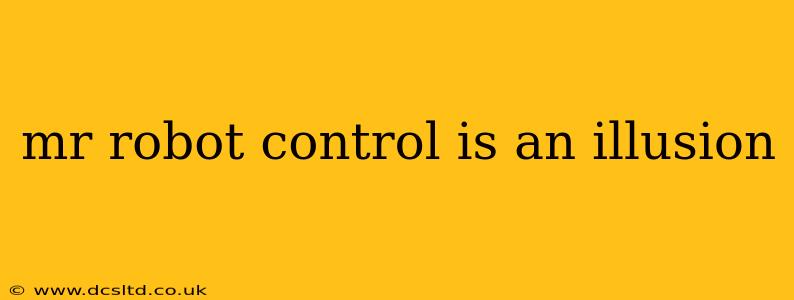Mr. Robot: Control Is an Illusion – Exploring the Series' Core Theme
Mr. Robot, the critically acclaimed USA Network series, isn't just a thrilling hacker drama; it's a profound exploration of control, its illusionary nature, and the devastating consequences of clinging to the belief in it. The show masterfully weaves together intricate storylines, compelling characters, and philosophical undercurrents to unravel the complex tapestry of power, manipulation, and the human psyche. This article delves into the central theme of the series: the illusion of control, examining how it manifests in the lives of the characters and the wider societal context.
What is the central theme of Mr. Robot?
The overarching theme of Mr. Robot is the pervasive illusion of control in a world increasingly dominated by technology and corporate power. Elliot Alderson, the show's protagonist, embodies this struggle. His hacking prowess, initially perceived as a means of control, ironically reveals his profound lack of control over his own life, mental health, and relationships. He seeks to dismantle powerful entities like E Corp, believing this act will bring about order and justice, yet his actions consistently spiral out of his control, leading to chaos and unpredictable consequences. The show consistently questions whether any true control exists, suggesting that our perceived agency is often an illusion, shaped by external forces and internal struggles.
Is Mr. Robot a realistic portrayal of hacking?
While Mr. Robot showcases impressive technical skills and intricate hacking sequences, its depiction of hacking isn't entirely realistic. The show takes creative liberties for dramatic effect, often simplifying complex processes and amplifying the impact of cyberattacks. However, the series accurately captures the psychological and social aspects of hacking, highlighting the potential for both individual empowerment and devastating societal disruption. The show's focus lies less on the technical intricacies and more on the psychological impact and the ethical dilemmas surrounding the use of technology.
How does Mr. Robot explore the themes of mental illness and control?
Elliot's struggle with mental illness, specifically social anxiety and dissociative identity disorder, is intricately woven into the theme of control. His mental state significantly impacts his ability to perceive and exert control over his environment. His fragmented personality and unreliable narration blur the lines between reality and delusion, constantly questioning what is real and what is a product of his condition. This blurring of reality further reinforces the show's central theme – the elusive nature of control, both internal and external.
What is the significance of the fsociety group in Mr. Robot?
fsociety, the anarchist hacker group Elliot joins, initially seems to offer a sense of belonging and purpose, a shared goal of dismantling corporate power. However, even within this group, control is far from absolute. The group's actions, fueled by idealistic aims, often result in unintended consequences and internal conflicts. The show reveals the limitations of collective action and the difficulty of maintaining control, even within a group united by a common goal.
Does Mr. Robot offer a message of hope or despair?
Mr. Robot doesn't offer easy answers or simplistic conclusions. The show presents a nuanced and complex perspective on the illusion of control, leaving the audience to ponder the implications and draw their own conclusions. While the series showcases the devastating consequences of unchecked power and the limitations of individual agency, it also highlights the potential for human connection, resilience, and the possibility of finding meaning amidst chaos. The ending, while ambiguous, suggests a glimmer of hope for Elliot, implying that even amidst the illusion of control, self-awareness and acceptance can be a path towards a more authentic existence.
In conclusion, Mr. Robot's exploration of the illusion of control is not merely a plot device; it's a central philosophical underpinning of the series. By weaving together complex characters, gripping storylines, and thought-provoking themes, the show compels viewers to question their own perceptions of control and navigate the complexities of a world where our perceived agency often falls short of reality.
